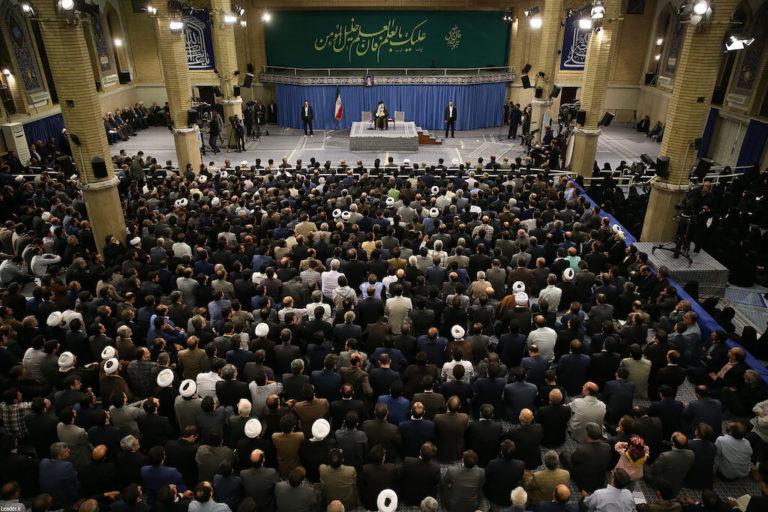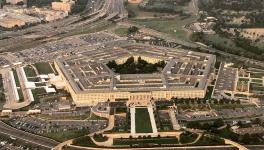Abe’s Mediatory Mission to Tehran Hangs in Balance

Iran’s Supreme Leader Ayatollah Ali Khamenei addresses an Eid gathering of academics, scholars, intellectuals and elites, Tehran, May 29, 2019
With two days to go for the arrival of Japanese Prime Minister Shinzo Abe in Tehran on a peace mission to promote US-Iran talks, a great deal of shadow boxing has been going on. Typically, there is much excitement in the media. Thus, western media in general hyped up the remarks of the commander of the US’ Lincoln strike group, Rear Adm. John F. G. Wade to make them sound belligerent and provocative.
However, Tehran has not fallen into that trap. The fact of the matter is that the US and Iranian militaries have deep experience in fathoming each other’s intentions and working out ground rules of co-habitation in the crowded waters of the Persian Gulf. This arrangement has worked fine for past 4 decades and quite obviously, a ‘new normal’ has come to exist lately with the recent deployment of a US nuclear strike group in the region.
The Tehran Times carried a sober report on Adm. Wade’s remarks bringing out vividly what the admiral wished to convey (and Iran’s appreciation of it) . The influential establishment daily highlighted Wade’s remark that “Since we’ve been operating in the region, we’ve had several interactions with Iranians. To this point all have been safe and professional — meaning, the Iranians have done nothing to impede our maneuverability or acted in a way which required us to take defensive measures.”
That just about sums up the state of play in the Persian Gulf. The facts are important. The Tehran Times reported: “One month after its arrival in the region, the Lincoln has not entered the Persian Gulf, and it’s not apparent that it will. The USS Gonzalez, a destroyer that is part of the Lincoln strike group, is operating in the Persian Gulf.”
“Last week, the Lincoln was some 320 kilometers (200 miles) off the eastern coast of Oman in the Arabian Sea. It would still need to pass through the Gulf of Oman and the Strait of Hormuz before reaching the Persian Gulf.” Clearly, the ‘new normal’ is not so precarious as made out by some media reports (here , here and here.) Surely, a lot of grandstanding is going on, but, war? Not a chance.
Meanwhile, the US has extended its sanctions on Iran’s oil industry to cover its largest petrochemical group. This appears to have been a decision in the pipeline but the timing of the announcement (on Friday) is intriguing — although it is a by-now familiar pattern of an inchoate Administration pulling in different directions. No doubt, Tehran has questioned the US’ true intentions by making such a move at this point in time when the air is full of talk about negotiations.
The Trump administration has taken a reckless step on the eve of Abe’s mission, which could have been avoided. It is a moot point whether Trump himself was aware of it or not. All the same, Tehran is approaching the talks with Abe calmly and purposively.
Unsurprisingly, Iran plays down the forthcoming talks. A commentaryin the Tehran Times in the weekend cited Washington’s move on Friday in extending the sanctions to the petrochemical sector as confirming that the White House has no intentions to “retreat” from its “maximum pressure” strategy. The commentary sees two-fold pressures as working on Trump — aversion to war in the US public opinion and the lack of support from allies apropos his Iran policies.
Interestingly, the commentary weighs on Abe’s mission, assessing that its outcome depends on two factors — “the ‘real will’ and determination of the US and Iran to solve the ongoing problems, especially the US’ ‘real will’ ” and secondly, Japan’s ability to influence US decisions.
Foreign Minister Javad Zarif has welcomed Abe’s visit — “We will carefully listen to Abe’s views, and then will express ours in detail.” But he stressed that the US must stop its ‘economic war’. He disclosed that Tehran has already sensitised Abe in the matter.
Importantly, the Spokesman of Iran’s Supreme National Security Council has noted that the success of Abe’s visit could be guaranteed if only Japan has made efforts to “return the US to the JCOPA (2015 nuclear deal) and compensate (sic) the losses suffered by Iran (due to sanctions)” as well as to remove the US sanctions regime.
Abe’s visit to Tehran is a milestone in Japan-Iran bilateral relations insofar as this is the first such event since the Islamic Revolution in 1979, although the two countries have kept up friendly ties all through. Tehran pins hopes that Abe can win waivers from the US to be able to buy oil from Iran.
Quite obviously, the benchmark for the Iranian negotiators will be the remarks made by Supreme Leader Ayatollah Ali Khamenei on May 29 during an an address to a gathering of Iranian academicians, researchers and elites in Tehran. Khamenei said that the bottomline is, “We will not negotiate on the core issues of the Revolution. Negotiations on this issue imply trading; that is, they mean we give up on our defensive capabilities. We will not negotiate our military capability.”
In general, Khamenei said the US has a history of targeting the assets of a country by pressurising it. In this, negotiation becomes a tactic to compel the interlocutor to trade its national assets. “They (US) pressure until the adversary gets tired, and then propose to negotiate. This negotiation is complementary to the pressure and aims to cash in on the pressures. They impose pressure and then propose to negotiate. This is what negotiation means to them. Their strategy is not negotiation. It is pressure. Negotiation is part of the pressure strategy.”
That is why, Khamenei underscored, Iran has had to resort to resistance as a “countermeasure.” To quote him, “The countermeasure for us (Iran) is to use our own means of pressures to contend their (US) pressure. However, if we are deceived by their call for negotiations and consider our means of pressures unnecessary, we would slip and that equals (means) absolute defeat.” (Excerpts of Khomeini’s speech are here.)
Get the latest reports & analysis with people's perspective on Protests, movements & deep analytical videos, discussions of the current affairs in your Telegram app. Subscribe to NewsClick's Telegram channel & get Real-Time updates on stories, as they get published on our website.
























